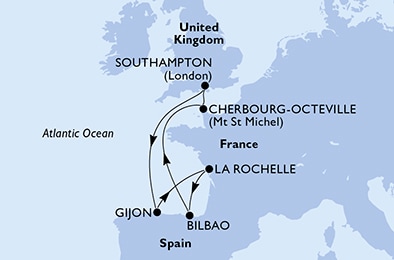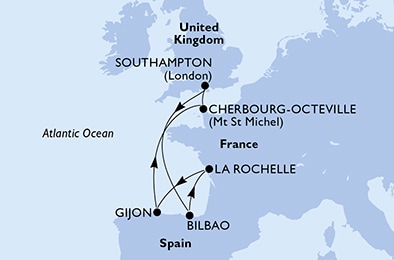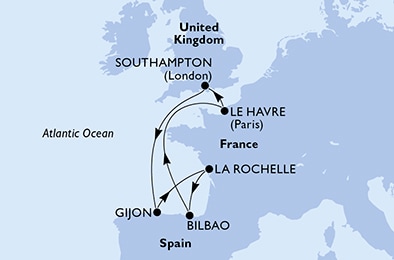
Port Gijón
Gijón, a vibrant coastal city in northern Spain’s Asturias region, seamlessly blends maritime heritage, industrial history, and natural beauty. Located along the Bay of Biscay, Gijón is known for its bustling port, sandy beaches like Playa de San Lorenzo, and its charming old quarter, Cimavilla. As the oldest part of the city, Cimavilla is perched on a hill and features narrow streets, traditional Asturian architecture, and landmarks such as the Elogio del Horizonte, a striking sculpture by Eduardo Chillida that offers panoramic views of the coastline.
The city is also a cultural hub, home to attractions like the Laboral City of Culture, a former university complex now hosting exhibitions and performances, and the Jovellanos Birthplace Museum, dedicated to one of Spain’s prominent Enlightenment figures. Gijón is well known for its Asturian cider culture, and visitors can enjoy this regional specialty in local sidrerías (cider houses), accompanied by traditional dishes like fabada asturiana (bean stew). With its mix of history, culture, gastronomy, and seaside charm, Gijón is a dynamic destination that captures the essence of Asturias.
History
Gijón, located in the region of Asturias in northern Spain, has a history that dates back over 2,000 years. Originally inhabited by the Cilúrnigos, a Celtic-Asturian tribe, it later became an important Roman settlement known as Gigia due to its strategic position on the Bay of Biscay. Evidence of the city’s Roman past, such as the Roman Baths of Campo Valdés, highlights its significance during antiquity. Following the fall of the Roman Empire, Gijón remained a small fishing village through the Middle Ages, gradually growing as a port for local trade.
In the 19th century, Gijón underwent significant industrialization, becoming a key center for coal, steel, and maritime shipping, which spurred rapid urbanization. The city also played a notable role in Spain’s turbulent history, serving as a Republican stronghold during the Spanish Civil War. Despite the destruction caused during that period, Gijón rebuilt and evolved, blending its industrial legacy with the preservation of its historical heritage, such as the Cimavilla district, the city’s oldest quarter. Today, Gijón reflects centuries of transformation, from its ancient roots to its modern role as a cultural and maritime hub in Asturias.










